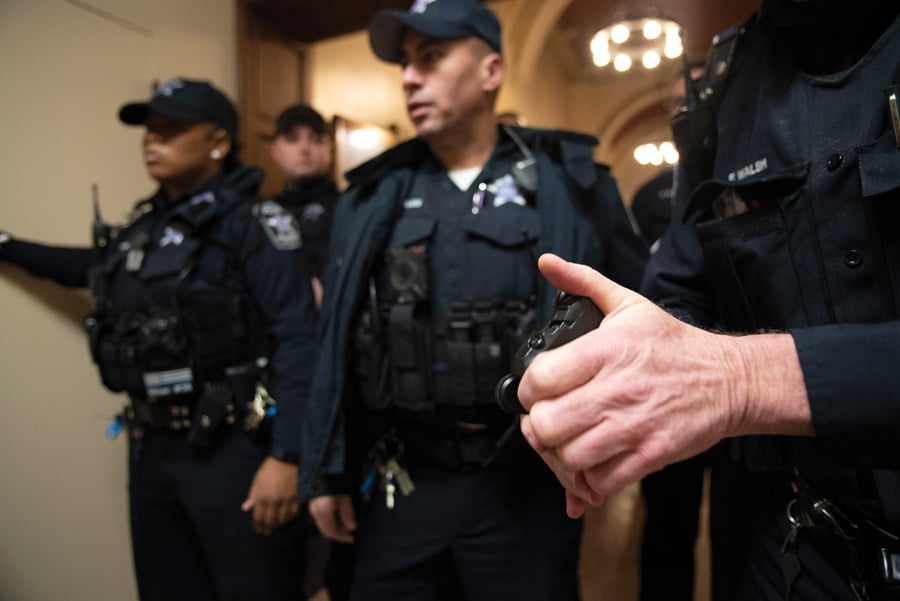Analysis | Northwestern’s relationship with NUPD, EPD
June 24, 2020
Within the past three weeks, many protesters fighting against systemic racism have asked for a path to defunding or abolishing police departments across the nation. While some have called this position controversial or impossible, it prompted questions from students about their own cities and universities: What is our community’s relationship with the local police?
On May 27, the University of Minnesota vowed to cut ties with the Minneapolis Police Department. More recently, a similar call for Northwestern to reevaluate their connection to the Northwestern University Police Department and the Evanston Police Department garnered thousands of signatures within a few days.
Below is an analysis of Northwestern’s relationship with both departments. While NU is a private institution, exempt from federally mandated Freedom of Information Act requests, EPD is not — additional information came from Daily articles, public records and interviews as noted.
What is the Northwestern University Police Department?
NUPD officers have jurisdiction on campus and nearby city streets, and hold the same enforcement powers as local officers under Illinois law. They have graduated from a state-approved police academy and passed field and firearm training.
Officers are able to investigate reported criminal incidents, file criminal charges, affect an arrest or execute a search warrant within their jurisdiction. NUPD also monitors the Blue Light telephones and camera alarm systems, patrols campus for security checks, and has working relationships with EPD, Chicago Police Department, Illinois State Police and the FBI. Officers also give educational programs about safety, provide event security or escorts, perform vacant house checks and more.
One notable initiative is NUPD’s “Community Policing Program,” where the department aims to promote a positive connection between officers and individuals at NU through increased informal police contact, among other goals.
University Police Chief Bruce Lewis said the University monitors around 1,500 cameras on campus. According to the department’s video and surveillance policy, this mainly concerns public areas like libraries and dining halls, as well as limited footage of residence halls.
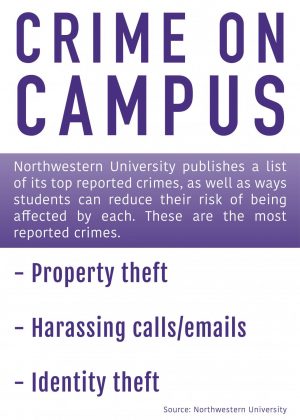 In 2015, the Chicago Reader did an analysis of Chicago-area university police departments, and found that as of 2011-12, NUPD officers were authorized to carry handguns, rifles, collapsible batons and pepper spray.
In 2015, the Chicago Reader did an analysis of Chicago-area university police departments, and found that as of 2011-12, NUPD officers were authorized to carry handguns, rifles, collapsible batons and pepper spray.
In terms of University spending on NUPD, Lewis said during a Tuesday Zoom call with administrators and students that the department’s funding makes up less than 1 percent of the overall budget. He did not disclose more details, citing the difficulty of working out a budget. The University’s operating expenses in FY19 totaled $2,511,191,000 — meaning NUPD’s funding could total up to $25 million.
NUPD accountability attempts
In 2016, NUPD began research on using body cameras, officially beginning the trial June 2017. As of Feb. 2018, sworn personnel were issued cameras and all sworn officers who responded to calls for service were to activate the cameras. However, the only parties who can view NUPD bodycam footage are the state’s attorney, courts and other attorneys associated with a particular case. Some recordings can be disclosed in accordance with FOIA: ones flagged as part of a complaint, when a firearm was discharged, a use of force incident, an arrest or detention, or death.
Illinois law specifies that recorded incidents that don’t fall within the above parameters will be automatically deleted within 90 days, unless it is used for training purposes. However, flagged footage cannot be destroyed or altered for two years. If it was used in a criminal, civil or administrative proceeding, it may not be destroyed “except upon a final disposition and order from the court.”
NUPD also has an advisory board, a version of which convened for the first time in November 2009 to address racial profiling on campus and University Police efficiency. Over the past 10 years, the late Vice President for Student Affairs Patricia Telles-Irvin attempted to restart the board a few times, but nothing consistent was realized after her death.
Lewis said the board meets twice a year and seats were extended to multiple organizations. Despite being on a list of student-run organizations on the NUPD’s website, several representatives from those groups told The Daily they did not know they were on the committee and said meetings did not occur on a regular basis.
Associated Student Government Vice President and Weinberg senior Juan Zuniga said former ASG President Izzy Dobbel (SESP ’20) and another student did have standing meetings with an NUPD deputy during Winter Quarter concerning the screening of potential hires. As for the organization’s role on the Advisory Board, former ASG Vice President for Student Life Vikas Kethineedi (McCormick ’18) told North by Northwestern in 2018 that six students were on the email list for a fall meeting but not everyone attended. He told the magazine that the meeting focused mostly on police updates.
On Tuesday’s Zoom call, Dean of Students Todd Adams said the board doesn’t usually meet at a convenient time where students could attend. Vice President for Student Affairs Julie Payne-Kirchmeier suggested incorporating community safety in the board’s scope could allow for a “different kind of dialogue” while maintaining an element of police review.
Student relationships with NUPD
NUPD publishes demographic information regarding both traffic stops and field stops, which can occur one of two ways. First, someone may contact NUPD by phone or by flagging down an officer for help investigating a situation, then point out or physically describe the person to be stopped by the police. Second, an officer on duty “identifies circumstances” that result in someone being stopped for further investigation. The legal standard, NUPD’s website states, to initiate a stop is a minimum of reasonable suspicion.
For the past five quarters, black people were stopped disproportionately relative to their population on the Evanston campus.
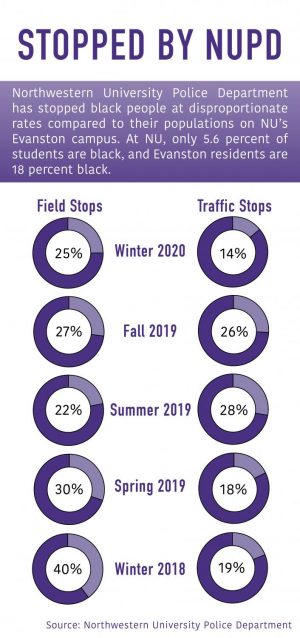
Most recently, in Winter 2020, black people made up 25 percent of all field stops, and about 14 percent of all traffic stops. Field stops were similar in Fall 2019, where black people made up about 27 percent of those stops, yet made up about 26 percent of traffic stops.
Numbers from the rest of 2019 are even more divided. In Summer 2019, traffic stops jumped, with black people making up about 28 percent of the stops, while in Spring 2019 black people made up about 30 percent of field stops and about 18 percent of traffic stops. Finally, in Winter 2019, black people counted for 40 percent of field stops and about 19 percent of traffic stops.
For comparison, Northwestern’s student population is only 5.6 percent black, and Evanston’s population is 18 percent black.
However, field and traffic stops for white students seemed to line up with or exceed their undergraduate proportion. In Winter 2020, almost 48 percent of field stops and 67 percent of traffic stops were white students. In Fall 2019, almost 57 percent of field stops and more than 42 percent of traffic stops were white students.
The only time white students were not the majority of stops were during field stops on the Chicago campus: Of the five field stops made in Summer 2019, four people were black. Of the seven field stops made in Spring 2019, two were Hispanic and four were black.
The University also publishes its most common reported crimes: property theft, harassing calls/emails and identity theft.
In November 2019, students held protests against the invitation of former U.S. Attorney General Jeff Sessions to Northwestern’s Evanston campus. Since then, students have said NUPD and EPD officers used force against them. NU alumni also wrote an open letter to University President Morton Schapiro and Lewis, condemning the brutalization of student protestors at the event.
Schapiro has repeatedly denied that NUPD officers were violent. At an event in November after the protest, Schapiro said “the police force used tremendous restraint and professionalism.” In response to the alumni letter, Schapiro wrote in a one-sentence email, “Your statement that ‘NUPD officers brutalized multiple student protestors in defense of Sessions and the fascist ideologies for which he stands’ isn’t what in fact happened here.”
Following a one-month investigation of the protests, NUPD cited several students for “disorderly conduct and interfering with the duties of a police officer.” The city dropped those charges in January.
Northwestern’s relationship with EPD
Northwestern sits in EPD patrol beat 76, which includes parts of the 1st, 5th and 7th Wards. EPD Deputy Chief Aretha Barnes said one officer typically patrols beat 76.
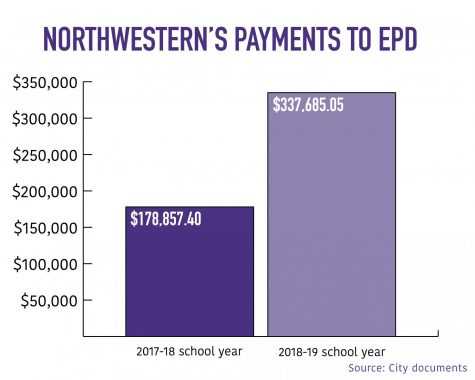
NUPD and EPD collaborate to oversee campus security, according to the University’s 2019 Security Report. When female students reported cases of grabbing in November 2018, the departments partnered to increase patrols of off-campus areas, according to EPD’s 2018 Annual Report.
The University maintains an Agreement for Mutual Cooperation with EPD. The agreement outlines jurisdictional boundaries for the police departments. Specifically, EPD maintains primary investigatory responsibilities for on-campus deaths, sexual assault cases or cases of abuse involving children.
Northwestern also relies heavily on EPD for special events, including Dillo Day and athletic events. In the 2017-18 academic year, the University paid EPD upwards of $178,000, according to documents obtained by the Daily. In the 2018-19 academic year, the University paid the department over $337,000.
Graduation proved to be the most costly single event expense. The University paid EPD about $60,746 for the 2018 Commencement ceremonies and about $67,942 for the 2019 Commencement ceremonies.
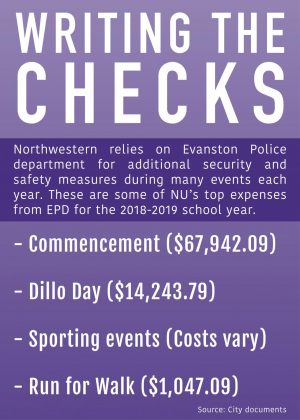
Of the funds given to EPD in the 2017-18 and 2018-19 academic years, 54.8 percent, or about $283,040.06, went toward sporting events, according to documents obtained by The Daily. Different sporting games require different levels of EPD support, Evanston Police Cmdr. Brian Henry said in an email, and are paid by NU as off-duty details.
Football games generally require 35 to 45 EPD officers for stadium and traffic, but Henry said large games could require more personnel. Security costs ranged from $10,700 to $48,000. In contrast, basketball games require around 12 officers. A men’s game could cost the University anywhere from about $2,300 to about $5,800 for policing.
For Dillo Day, Northwestern’s annual all-day music festival, EPD operates differently. Henry said EPD deploys its Problem Solving Team, a community policing unit, to off-campus areas. The team is made up of a supervisor and seven officers. EPD works closely with NUPD throughout the event, he said.
In 2019, the University paid about $14,203 to EPD for Dillo Day. Transaction records show the University also paid $575 to the city’s Parks, Recreation and Community Services staff.
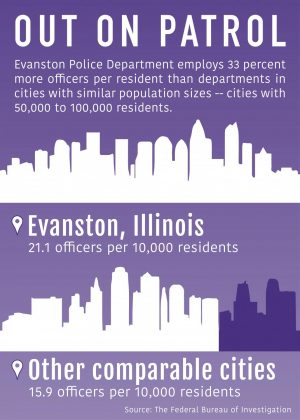
Evanston Police Department employs 33 percent more officers than departments in cities with similar populations, according to 2016 FBI statistics. For cities with populations between 50,000 and 100,000 people, departments employ 15.9 officers per 10,000 residents on average. In comparison, EPD employs 21.1 per 10,000 residents. The statistics do not include NUPD officers.
In 2016, Alan Anderson, then-executive director of neighborhood and community relations, told The Daily a larger local police force helps UP with overseeing security, especially before bigger special events.
The University has hired EPD for services beyond security detail for special events. In March 2017, EPD Victim Services Bureau provided training to the NUPD in accordance to NU Campus Coalition on Sexual Violence. In Sept. 2017, the Institute for Sustainability and Energy at Northwestern hired Evanston police to assist with a “house move” for over $3,000, according to records obtained by The Daily.
Moving forward
During the Tuesday Zoom meeting with administrators, students asked for more information concerning NUPD’s budget and specific actions the University plans to take to address students’ demands, which University representatives were unable to provide at that time. The next time community members and administrators will reconvene is July.
Gabby Birenbaum and Yunkyo Kim contributed reporting.
Email: snehadey@u.northwestern.edu
Twitter: @snehadey_
Email: emmaedmund2022@u.northwestern.edu
Twitter: @emmaeedmund
Email: mmartinez@u.northwestern.edu
Twitter: @mar1ssamart1nez

